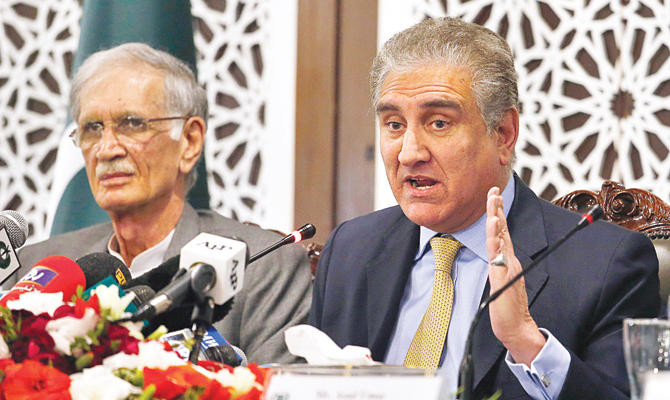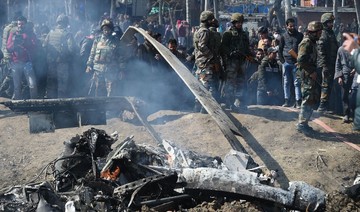NEW DELHI/ISLAMABAD: Pakistani Foreign Minister Shah Mehmood Qureshi on Tuesday said his country would respond to India’s “act of aggression” in sending fighter jets across the de facto border between the two nuclear-armed neighbors.
However, Pakistan rejected New Delhi’s claim that the warplanes had carried out air strikes on a militant training camp, killing large numbers of terrorist fighters.
In a series of Twitter posts on Tuesday, Pakistani military spokesman Maj. Gen. Asif Ghafoor said that Indian jets had violated the Line of Control (LoC) which splits the disputed Kashmir region into two areas, one administered by Pakistan and the other by India.
Ghafoor said the Indian planes “hastily escaped” after Pakistan scrambled its own jets, and “no infrastructure got hit” in the confrontation.
But Indian Foreign Secretary Vijay Gokhale said his country’s fighter jets had struck “the biggest training camp” of the Pakistan-based militant group Jaish-e-Mohammed (JeM), near Balakot, about 50 km from the LoC in Kashmir. He added that many militants, trainers, senior commanders and attackers training for guerrilla action had been killed in the raid.
In a statement, Qureshi said the Pakistani government would hold a joint session of Parliament on Wednesday as well as a meeting of the National Command Authority which overseas Pakistan’s nuclear weapons, to decide on its next step.
“PM (Prime Minister Imran Khan) has directed that elements of national power including the armed forces and the people of Pakistan remain prepared for all eventualities,” Qureshi added.
The General Secretariat of the Organization of Islamic Cooperation (OIC) condemned India’s action against one of its founding members but urged both countries to exercise restraint and avoid any steps that could endanger peace and security in the region.
Gokhale said: “In an intelligence-led operation in the early hours of today (Tuesday), India struck the biggest training camp of JeM in Balakot. A very large number of JeM terrorists, trainers, senior commanders and groups of jihadis who were being trained for fidayeen (guerrilla) action were eliminated.”
He added that the commander of the targeted camp was Maulana Yusuf Azhar, a brother-in-law of JeM leader Masood Azhar.
India had decided to act after receiving “credible intelligence” that JeM was planning more attacks in India, Gokhale said.
Indian Prime Minister Narendra Modi held a high-level security meeting after the air strikes and later said at a political rally that “the country is in safe hands.”
“I won’t let the country down,” Modi said. “We won’t let this country bow down.”
India’s breach has raised the possibility of military escalation between archrivals Pakistan and India who have fought three wars since they gained independence from the British in 1947, two of them over Kashmir, which the neighbors both claim in full but rule in part.
The air incursion comes two weeks after the terror attack in Jammu and Kashmir’s Pulwama in which at least 40 Indian soldiers died.
Speaking to journalists, Qureshi said: “This is aggression against Pakistan and Pakistan will respond. The situation is unfolding and God willing, at the political level, at the diplomatic level and at the military level, Pakistan is engaged in planning and Pakistan will also respond.”
Qureshi was reading from a statement issued after a meeting of the Pakistani National Security Committee chaired by Prime Minister Imran Khan and said the “forum concluded that India has committed uncalled-for aggression to which Pakistan shall respond at the time and place of its choosing.”
The foreign minister added: “Once again the Indian government has resorted to a self-serving, reckless and fictitious claim (the raid on the camp near Balakot).”
Addressing a press conference in Islamabad’s twin city of Rawalpindi, Maj. Gen. Ghafoor said India had failed to surprise Pakistan. “We were ready, we responded, we denied,” he said. “It is your (India’s) turn now to wait and get ready for our surprise … Our response will be different, and the response will come.”
Ghafoor said Indian jets, which were in Pakistani airspace for about four minutes, remained within 4-5 nautical miles of the LoC and deployed four bombs that hit open ground in Jaba, about 12 km from Balakot.
Mohammad Adil, a resident of Jaba, told local media that villagers heard a “hard, terrifying sound” at around 3 a.m. on Tuesday morning which they initially thought was an earthquake or a thunderstorm. This was followed by the sound of five blasts.
“After 5-10 minutes the sound subsided,” he said. In the morning, villagers found “a large hole in the ground.” Adil added: “Four or five houses were damaged, and one person was also injured.”
Reuters quoted an unnamed resident as saying the blasts had occurred near a JeM-run seminary on the top of a hill.
In condemning India’s attack the OIC’s General Secretariat called upon both countries to act responsibly and encouraged them to seek a peaceful solution to the crisis. It suggested dialogue as a matter of priority to work toward de-escalation of the current situation.
Pakistan vows to respond over India’s ‘act of aggression’ after air strikes
Pakistan vows to respond over India’s ‘act of aggression’ after air strikes

- India’s breach raises the possibility of military escalation between archrivals












